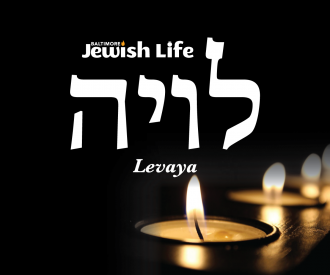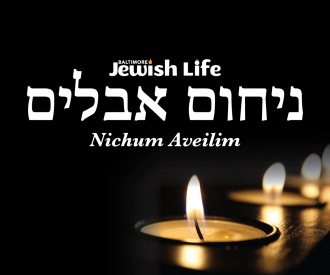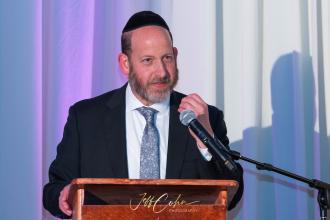Baltimore, MD - Oct. 4, 2015 - Hoshana Rabba 5776:
Dear Jeff,
I just returned from mincha at the Churva. It is moments before Shkiah and the normally teeming streets of the Old City are earily quiet. Yerushalayim Haatikah feels under siege. Rav Chaim Kanievsky reportedly instructed people to stay away from the Kotel until further notice.
The poor of the the Old City are the soldiers on the front line, keeping Yerushalayim Jewish at great mesiras nefesh. As we know, tefillah, tshuva and tzedakah can annul the evil the decree, which we see plainly through our tears here. Tzedakah tatzil m’maves.
I call on my brothers and sisters in Chutz Laaretz to lend their support at this time of need in support of Yerushalayim. A more detailed note from my chavrusa, who is the gabbai tzedakah for this “no load” project that feeds the poor of the Old City is below. I ask that this be read and distributed for Yom Tov. I personally vouch that this is the highest level of tzedakah.
Chag sameach,
Michael
###
BS”D
Beginning in 1989, a group of three friends began disbursing funds at the holidays to local people in need, at the request of donors in the states. We called it the Family Fund. That service is still functioning and has expanded its scope.
The Family Fund now runs two basic programs. The first was the Holiday Distributions, which still distributes cash to meet the acute needs of the poor at the two major crunch times of the year, Pesach and Rosh HaShana. The expansion program is now an ongoing Food Project called Chasdei Yechezkel, founded in 2002 as a grass roots volunteer organization to serve the nutritional needs of the Jewish poor in the Old City of Jerusalem. Actually, it was hardly “founded”. It sprang up.
Altogether, The Family Fund currently serves approximately 500 people on a weekly basis and nearly 1000 people at the chaggim.
The depressed economic situation in Israel in 2002 created a new class of working poor, unprecedented in our lifetime. As a result of a dire economic situation, one or both spouses in two income families had lost jobs or experienced draconian cutbacks in salary in order to keep a job. There were cutbacks and/or elimination of social services, as well, that were historically built into the economy and the pay scale, making them integral to the household budgets of the vast majority of the people living in Israel. The outcome was that many middle class families could no longer put food on the table to feed their families. Parents were taking turns skipping meals so the kids could eat and those who were eating were usually eating improperly, buying food to fill them but nutritionally insufficient.
The founders of the Food Project spoke to the doctors in the local Kupat Cholim about malnutrition and asked that they keep track of families whom they saw were suffering. We spoke to teachers in the local schools and asked them to note what kids were bringing for lunch and snacks. We spoke to people who were active in the different sub-communities to be aware of neighbors who had lost jobs or seemed to be struggling, in general. We created a network of local people operating in the course of their normal lives and had community leaders make inquiries. With a very informal database, we built a template that served the community and even became recognized by other communities in Israel. Clearly, the grass roots nature and spirit of volunteerism had cut out a major problem in any such project, bureaucratic malfunction.
Scouts seek out potential families in need. Often, recipients do not recognize or admit to themselves, let alone others, that they require help. Information is shared only on a need to know basis. Potential cases are brought to a three person panel of rabbis, expert in the halachos of tzedaka. Heading the panel is Rabbi Yehoshua Zilberman, shlit’a. Other rabbis and residents have served with him for varying terms. We have cross over supervision and cooperation with the Kupat Tzedaka of the Old City under the auspices of Rav Nevensahl, shlit’a. Cases are constantly reviewed and names are added and deleted as needs and circumstances change. This being said, we have found the Food Project serving between 80 and 90 families, approximately 500 people, on an ongoing weekly basis throughout these years.
The goal of the Food Project is to improve health by improving diets. All food is purchased at a wholesaler by a volunteer expert buyer, thereby stretching the dollars of this fund. Food is packed and delivered each week, discretely, by a cadre of dedicated volunteers. We do not use coupons or give money to buy food. We choose, buy and deliver the food which will rot if not eaten. That’s why we believe that we’ve had such good results. The budget for this project is approximately $10,000 a month. We have been told by doctors at the local Kupat Cholim that this neighborhood is blessed to have apparently wiped out the malnutrition that was once here.
Holiday times highlight and add to the financial stress. Often, households do not have the financial resources to provide for their families’ specific holiday needs. Growing kids needs shoes. Clothing purchases are essential as the seasons change. People don’t have money year round and at holiday time fixing a table is not a luxury. The basic social safety net does not address these needs.
Twice yearly, before Pesach and before Succos, the Family Fund distributes an expanded shopping list of foods to an expanded list of recipients based on family size and need. Cash stipends are also distributed, helping families with their own extraordinary needs related to the holiday. This is the expanded version of our original Holiday Distributions that began in 1989. Again, this is done with the review of the rabbinic panel. Stipends are calculated based on need and family size. There are no blanket gifts to sub-communities. No Jews are excluded due to denominational affiliation. If they live within the ancient boundaries of Yerushalayim and are in need they are eligible.
The Family Fund has united the community under an umbrella of chessed and charity. It has assisted those in need in a discrete manner that does not embarrass the recipient. It distributes every dollar collected in the most efficient manner possible, with no overhead. The leadership of The Family Fund is committed to growing only so far as they are able to account for every penny raised and distributed and to raise funds only to the extent of the need.
Funds raised in the United States are sent through the American Friends of Old City Charity, which has a recognized 501(3c) exemption as a charitable organization by the United States Internal Revenue Service and is permitted to disburse funds here.
For Israeli contributions, we receive donations at נר לרחל ובניה, which has a סעיף 46 exemption.
Our fundraising efforts are also done by volunteers and cannot compete with fulltime professionals. Nevertheless, our small but loyal donor base has been keeping this project going for years.
There is neither administrative overhead nor salaries, at all. Every dollar raised pays for food all year and stipends at the holidays.
As mentioned above, the monthly Food Project budget, which serves approximately 85 families with frozen chickens, fresh fruits and vegetables weekly, is $10,000. Our Holiday Distribution budget, which distributes food and money before the holidays to a much larger list of recipients, runs about $75,000 before Succos and again before Pesach. In the months in which the Holiday Distributions occur, the monthly Food Project budget is subsumed in the Holiday Distributions, making our annual budget approximately $250,000, obviously based upon availability of funds. We have experienced short slowdowns in recent years but have not stopped operating since the inception. We really can’t. In fact, there is more to do, within the same template if only our budget allowed.
For further information feel free to contact me, Tzvi Aryeh Ingber at taingber@014.net.il or 02-626-1669.
For USA tax consideration; Contributions can be written to;
American Friends of Old City Charities
and mailed to:
American Friends of Old City Charities
% Avery Gross, Esq.
30 Bay Street
Staten Island, N.Y. 10301
IMPORTANT: Please note on the memo: Family Fund
The IRS Tax ID of American Friends of Old City Charities is EIN 13-3743550/DLN 17053037758009.
For ISRAELI tax consideration; Contributions can be written to;
Ner L’Rachel U’Vaneha (Chasdei Yechezkel)
and mailed to:
Ner L’Rachel U’Vaneha
P.O.Box 112
Jerusalem 91000















